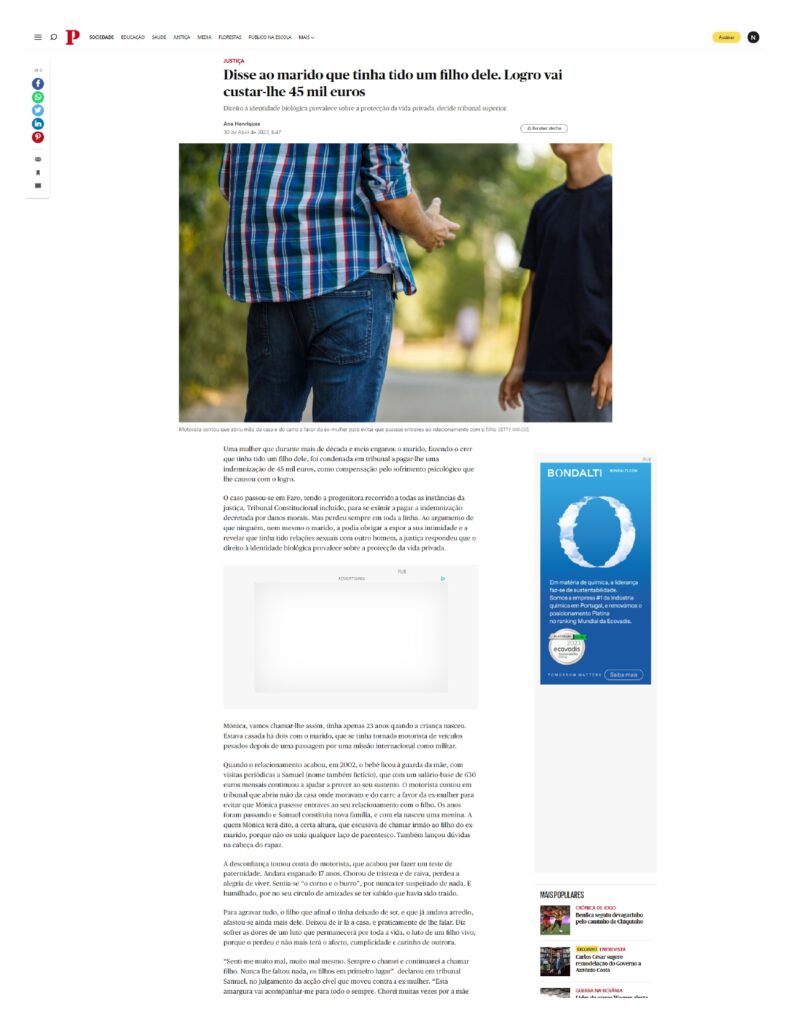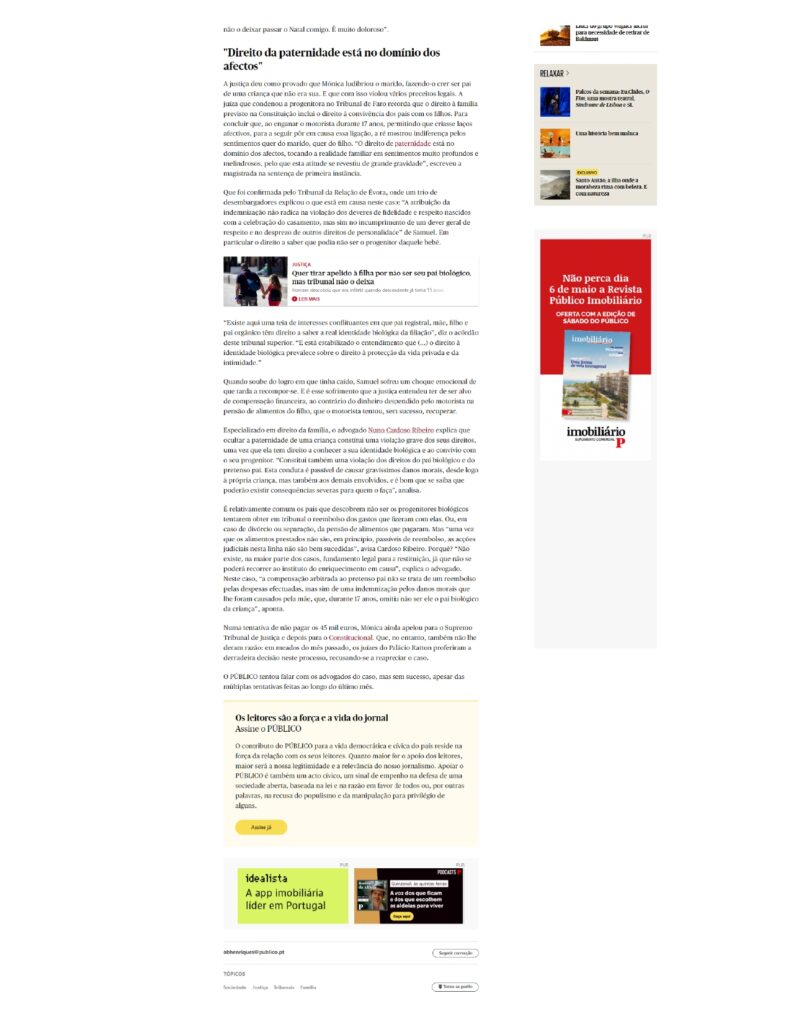Our coordinator, Dr. Nuno Cardoso-Ribeiro, has given statements to the Portuguese newspaper Público regarding whether concealing the paternity of a child constitutes a serious violation of his rights. The news covers a Portuguese case in which the Court ruled that a woman, for having made believe that her husband was the father of a child that was not hers, would pay compensation for moral damages amounting to 45 thousand euros.
Read the news on the Público website or the translation and in pdf below:
“She told her husband that she had had his child. Deception will cost her 45 thousand euros
Right to biological identity prevails over protection of private life, decides high court.
A woman who for more than a decade and a half deceived her husband into believing she had had a child of his, was ordered in court to pay him an indemnity of 45,000 euros as compensation for the psychological suffering she caused him with the deception.
The case took place in Faro, and the mother appealed to all instances of justice, including the Constitutional Court, to get out of paying the compensation decreed for moral damages. But she lost every time. To the argument that no one, not even her husband, could force her to expose her intimacy and reveal that she had had sexual relations with another man, the court replied that the right to biological identity prevails over the protection of private life.
Monica, let’s call her, was only 23 years old when the child was born. She had been married for two years to her husband, who had become a truck driver after a stint in an international military mission.
When the relationship ended in 2002, the baby was left in the mother’s care, with periodic visits to Samuel (also a fictitious name), who continued to help provide for her with a basic monthly salary of 630 euros. The driver told the court that he gave up the house where they lived and the car in favor of his ex-wife to prevent Monica from hindering his relationship with his son. The years went by and Samuel started a new family, and a baby girl was born with her. At a certain point Monica said that she didn’t need to call her ex-husband’s son her brother, because they were not related. She also cast doubt in the boy’s mind.
The driver became suspicious and ended up taking a paternity test. He had been mistaken for 17 years. He cried with sadness and anger, and lost his joy for life. He felt like “the cuckold and the donkey” for never having suspected anything. And humiliated, because in his circle of friends it was known that he had been betrayed.
To make things worse, his son, who had after all stopped seeing himself, and who was already distant, became even more distant from him. He stopped coming to the house and practically stopped speaking to him. He says he suffers the pain of a grief that will last a lifetime, the grief of a living son, because he lost him and will no longer have the affection, complicity, and affection he once had.
“I felt very bad, really bad. I have always called him and will continue to call him son. He never said anything to her, his children came first,” Samuel declared in court during the trial of the civil suit he filed against his ex-wife: “This bitterness will be with me forever and ever. I cried many times because his mother wouldn’t let him spend Christmas with me. It’s very painful.
“Paternity law is in the realm of affections”
The justice system has proven that Monica deceived her husband, making him believe he was the father of a child that was not his. And that with this she violated several legal precepts. The judge who convicted the mother in the Faro Court recalls that the right to family life foreseen in the Constitution includes the right of parents to be with their children. In concluding that by deceiving the driver for 17 years, allowing him to create an affective bond, and then jeopardizing that bond, the defendant showed indifference to the feelings of both her husband and her son. “The right of paternity is in the domain of the affections, touching the family reality in very deep and sensitive feelings, so that this attitude was of great gravity,” wrote the magistrate in the first instance sentence.
Which was confirmed by the Court of Appeal of Evora, where a trio of judges explained what is at stake in this case: “The awarding of damages is not rooted in the violation of the duties of fidelity and respect born with the celebration of marriage, but rather in the breach of a general duty of respect and contempt for other rights of personality” of Samuel. In particular the right to know that he might not be the parent of that baby.
“There is a web of conflicting interests here in which registral father, mother, child and organic father are entitled to know the real biological identity of the parentage,” says the ruling of this high court. “And the understanding is stabilized that (…) the right to biological identity prevails over the protection of private life and intimacy.”
When he learned of the deception he had fallen into, Samuel suffered an emotional shock from which he is slow to recover. And it is this suffering that the courts have ruled must be subject to financial compensation, unlike the money spent by the driver on child support, which the driver has tried unsuccessfully to recover.
Specialized in family law, lawyer Nuno Cardoso Ribeiro explains that concealing the paternity of a child is a serious violation of his rights, since the child has the right to know his biological identity and to be with his parent. This conduct is likely to cause very serious moral damage, firstly to the child herself, but also to others involved, and it is good to know that there may be severe consequences for those who do it,” he analyzes.
It is relatively common for parents who discover that they are not the biological parents to try to obtain in court the reimbursement of the expenses they have incurred with them. Or, in case of divorce or separation, of the alimony they paid. But “since the alimony paid is not, in principle, reimbursable, legal actions along these lines are not successful” warns Cardoso-Ribeiro.
“In most cases, there is no legal basis for restitution, since one cannot resort to the institute of unjust enrichment,” explains the lawyer. In this case “the compensation awarded to the alleged father is not a reimbursement for expenses incurred, but rather compensation for the moral damage caused to him by the mother, who, for 17 years, omitted to be the biological father of the child,” he points out.
In an attempt not to pay the 45 thousand euros, Mónica still appealed to the Supreme Court of Justice and then to the Constitutional Court. In the middle of last month, the judges at the Ratton Palace issued the final decision in the case, refusing to re-examine the case.
PÚBLICO tried to talk to the lawyers in the case, but without success, despite multiple attempts over the past month.”

